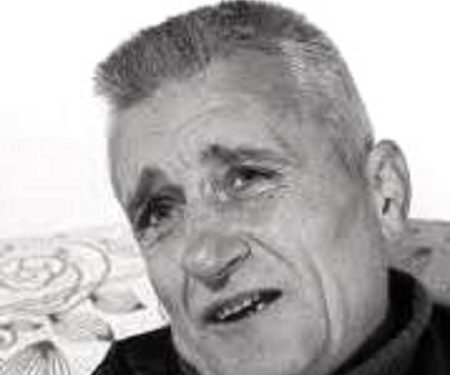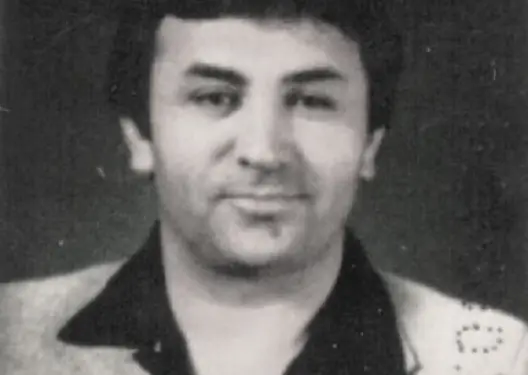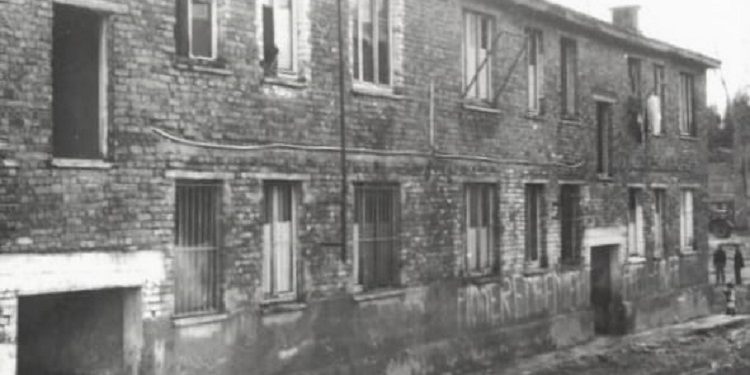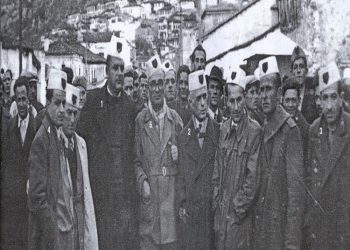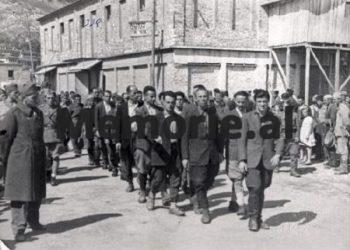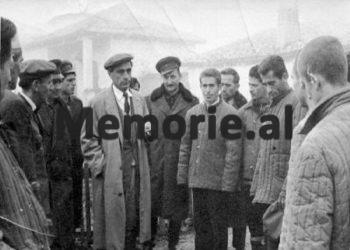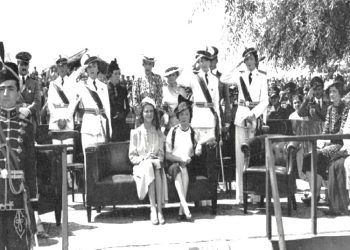From Luljeta Progni
Memorie.al / Ilir Çullhaj was born in the village of Cermë in Lushnja, where the communist regime had forced his parents to live in mud huts…! Iliri was born there, exiled. He grew up there in Çerma and continues to live there even today. Ilir Çullhaj’s story tells us how a man is born and grows up in exile and continues to be condemned to stay where he was born, with the label of “enemy of the people”. Condemned to pass every day those streets, where he grew up despised, to meet the streets of that village, people who once persecuted him, denied him bread, the right to education, took away his child’s smile, robbed him of his dreams for the future. And yet, Iliri does not feel hatred for anyone, much less revenge.
It was December 7, 1970, when German Chancellor Willy Brandt visited the memorial in Warsaw commemorating the Jews killed by Nazism. He knelt down as a sign of sympathy for the victims of Nazism. It was the first visit by a head of the German government to Poland after the Second World War.
His image, kneeling before the tragic history of the Jews, was an act that fundamentally influenced the improvement of the image of the Germans in the international arena. Because after Willy Brand, chancellors and other high officials of the German state repeatedly apologized for the victims of Nazism.
In Albania, there are thousands of victims of communist totalitarianism, who never received anyone’s apology for the crimes the state committed against them and their children. Not from the executioners, but not from their descendants, who inherited the party-state. During the communist regime, from 1944 to 1990, about 6,000 people were killed, 34,000 were imprisoned and more than 50,000 were sent to internment camps.
Ilir Çullhaj was born in the internment camp in Cerma, Lushnja. His father, Hysen Çullhaj, spent five years in the Tepelena camp. Afterwards, he was transferred to the internment camps in Lushnja. During that time, he was convicted twice and spent 10 years in prison. After prison, together with his family, he was placed in the internment camp in Cerma, Lushnja. The punishment came because Hysen’s father, Veiz Çullhaj, had escaped, after being declared an enemy of the people.
Ilir Çullhaj was born in Çerma, he grew up there and today he still lives in Çerma. In addition to other sufferings of his arduous life, he has a pledge that comes as an appeal for Albanian politics and society, in 30 years. An apology missing from the executioners and their descendants. Iliri painfully recounts the painful history of the family, how the father and the whole family were trained in Tepelena. His father was only 14 years old.
Iliri has grown up with the stories of his father’s pain. He told him what happened in Tepelena and how children, women and old people were treated. Convinced that the ordeal of suffering would be long, the sons of the Çullhaj family began to build their lives in exile. The eldest of the family got married in the Tepelena camp. He suffered together with his father, constant persecutions. The time when the dictatorship asked them to deny the fugitive grandfather, Veiz.
After the Tepelena camp, his family continued their internment in the Lushnje camps. Hysen’s mother and father would build their lives in Çerma in Lushnja, because they were trained there. Ilir Çullhaj was born and raised there. He was born and grew up as an “enemy of the people” in a hut in Cerma, Lushnja. He remembers the suffering as a child, the persecution by the communist regime. He never had the right to education. Undoubtedly, this is a hostage that Iliri Çullhaj will keep forever. But what he will never forget is the contempt he felt as a child. When the communist regime fell, Iliri and his family tried to return to their country in Elbasan. But they could not succeed because the persecution continued.
Unable to return to his country of origin, Iliri started to improve his life there in Çerma, where he was punished by the dictatorship. He says that he already feels respected, but continues to suffer the worry of being abandoned by the institutions, to return the right that belongs to him. Ilir Çullhaj does not hate anyone, not even those who persecute him, but he wants someone to apologize and, for those who never repented for the crimes they committed, to have a trial.
The story of Ilir Çullhaj shows us the approach that the Albanian state and society had, in 30 years, to this stratum that was unjustly persecuted. It shows how a man is born and grows up in exile and continues to be condemned, to stay where he was born with the stamp of “enemy of the people”. Condemned to pass every day those streets, where he grew up with the stamp of the enemy of the people, to meet on the streets of that village, people who once persecuted him, denied him bread, the right to education, took away his child’s smile, robbed him of his dreams for the future. And yet, Iliri does not feel hatred for anyone, let alone revenge.
After 30 years, it seems quite impossible to recover the pain of thousands of Albanians who suffered the communist dictatorship. It seems quite impossible that Ilir Çullhaj and his ilk will one day see images similar to the one on December 7, 1970, of the German chancellor kneeling in front of the memorial that describes the human pain of the herbs…! On the contrary, in Albania we have seen and apparently, we will continue to see executioners in the floor of the Assembly of Albania, in ministerial posts and in all public administration departments.
Ilir Çullhaj and his ilk have seen, and apparently will continue to see for a long time, Gramoz Ruçi and his sons wearing the pioneer’s scarf and the dictator’s banners, revoking the history of 45 years of dictatorial violence, which kept Albania isolated from the whole world. While Ilir Çullhaj is still waiting for someone to apologize for the difficult life of his fathers, prisons and internment camps, for someone to apologize for why he was born in exile and grew up there, definitely someone to apologize, why Ilir Çullhaj is still living in the country where the dictatorship unjustly condemned him.
The full testimony of Ilir Çullhai!
“My great uncle, Isufi, my second uncle, Xhaferri, my father Hyseni, who is still alive, my deceased uncle, Shefqeti, the other two uncles, who were born in the Berat camp, when my grandfather escaped, who left behind his pregnant wife, Hysniu and Tomorri. They didn’t care if they died, children or old people died, they didn’t mind at all. Even an officer, a captain named Tomorr, I think.
As my great uncle Isufi used to tell me; “He took the children out of bed with difficulty to go out to appeal, they were sick, they were eaten or not eaten, he could hardly catch them, also the elders. There has even been an occasion – said the uncle; as soon as we fell asleep in the morning, because of the severe cold, the appeal would be made at 5:00 in the morning, this Captain Tomorri took us, he forcibly took us out there, with kicks, pushing us to make the appeal’ .
They were unmarried, even my uncle Xhaferri met his wife, Bedrie, then my second uncle Xhaferri, met the daughter of Feta Xhika, who was a political fugitive. There they got to know each other and there they laid wreaths in the camp of Tepelena (Bëna). Uncle, we belong to that area and uncle’s bride, Bedria, also belongs to that area. We had early connections with a word, that krushki were made according to the big tribes that belonged to that category. And there they met afterwards, when they were released they dispersed; in Gjaze, in Savër, in the end we ended up here in Çerme.
This happened that in 1967, the father was going to break up with his father, because the letters came, until 1967 they allowed him, after 1967, a decision was made that; “O cut off contact with your people, or you will go back to where you were”! The father refused, refused. Even when they were taken out, it was a center of emulation, the people’s cinema, as we called it. There, people were discredited with one word, it was the father’s turn”.
Chase by Security
“I was born in 1968, I went to primary school here. In 1983, I finished the eight-year school and enrolled in high school. They left me only one year. What happened…?! In 1984, Xhevdet Mustafa jumped here, somewhere in a village above us. Xhevdet Mustafa had met with my people in Brussels, with my grandfather, with my uncle, with all the people we had escaped there, in that country.
On the day that Xhevdet Mustafa was executed, we had multiple guards, so that we did not have contact with any person, because it is suspected that Xhevdet would come and have a meeting with us. He landed in Divjaka, with all his people. On that day, they guarded us with double-edged swords. Even we were renovating a kitchen, because we had an addition with brickwork, as we call it.
I was working, my father, I apologized to my brother, because he is no longer alive, and I was telling my father; ‘O father, these are the ones who come with double-edged swords like this…?! Shshsh – you tell me – take it, because they guard us, don’t have contact with anyone, so that we don’t get irritated and go join the gang, Xhevdet with his friends. See where Sigurimi’s judgment reached. He kept us that day, all day long, isolated, in a word.
They behaved very harshly, because we were this type of category, we didn’t hang out with the children who were in positions, the children of the Security. We didn’t socialize with them, we socialized only with people of our own mold. This always fell into dictation. Even when I was working in the brigade, after 1984, when I went to work, I hung out with these people in the brigade as well”.
Life in exile
“Opportunities were made selectively. Here we stayed here, many other family members left, we own the property in the villages of Elbasan, it is called Biçakaj. But even there the law 7501 penetrated. Our buildings that we had at that time had been demolished, they have made the village schools. We opened a trial for the nationalizations that were done to us, on the night of the date: 3.4.1946.
They also addressed us in court, they suspended us; ‘why didn’t we take note’, but we caught those people, who were the People’s Councils then, and they formulated all that they had taken from us. Despite that we couldn’t get anything, no notes, nothing. They suspended us. Today’s government, this democracy suspended us. But we, after all, did not rob them, we inherited them, we inherited them.
I had no one with the government of the Collaborationists or the Quislings. The uncle and father, who were executed in Elbasan, the one with the “Normal” of Elbasan, was also a road engineer-designer in Belsh of Elbasan. We are proud, just because we have the right to speak, and we are not despised anywhere. As for the benefits, which we were legally entitled to, we are not and remain not satisfied, at any moment until today.
What will happen later, we leave it to time to evaluate it where it should. But until today, we are not satisfied. So that you are not taken, you are excluded from the compensation measure, where you were forcibly taken from your home, deported, became a citizen and today you are not recognized, you are still in the place of deportation, and today you are not recognized as such. We can accept this. We cannot accept it”!
Lack of an apology
“Yes, we regret that all our executioners, some of whom are still alive today, were never tried for their monstrosities and crimes, which they had committed against this category as our work. I, legacy to my children, I will leave them, (I have small ones), and I will tell them that you do not know what happened to grandfather or grandmother, or uncle or uncle, or grandfather or great-grandfather.
That you have no right to ask for these things, for revenge work. You will pass these on to my children. This is how my father transmitted it to me, this is how I will also transmit it to him. But for those who do not show any remorse, even if they are still alive, who have committed various crimes, we demand this, insistently, that there be a retrial. A retrial…”! Memorie.al




